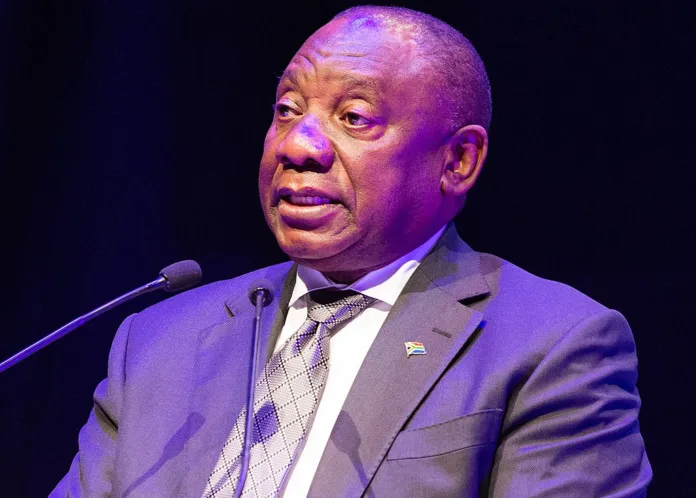Cyril Ramaphosa assumes office under a coalition government, emphasizing unity and collaboration in his inaugural address
On June 19, 2024, Cyril Ramaphosa took the oath of office as the President of South Africa’s seventh administration at the Union Buildings in Tshwane, Gauteng. His inauguration marks the beginning of a new era for the country, shaped by the results of the recent elections where no single party secured a majority to govern independently.
In his solemn oath, Ramaphosa pledged fidelity to the Republic of South Africa, setting the tone for his presidency defined by coalition governance. Addressing the nation shortly after, he emphasized the historic significance of forming a Government of National Unity (GNU), where political adversaries must set aside differences to prioritize national interests.
Embed from Getty ImagesRamaphosa acknowledged the electorate’s message, which reflected a decline in support for the African National Congress (ANC) to 40%, signalling a demand for change and accountability. He underscored the imperative for parties to collaborate in addressing economic growth, social justice, and sustainable development—a cornerstone of his administration’s agenda.
Key priorities outlined in his inaugural speech include combating poverty, safeguarding workers’ rights, ensuring government stability, improving state efficiency, investing in education and healthcare, combating corruption, and pursuing a foreign policy rooted in human rights and peace.
The formation of the GNU, comprising diverse political factions including the ANC, Democratic Alliance (DA), Inkatha Freedom Party (IFP), and others, is pivotal in Ramaphosa’s strategy to foster national cohesion and effective governance. Cabinet appointments, crucial to integrating coalition partners, are pending after consultations expected to accommodate the broad spectrum of political interests.
While facing criticism over the GNU’s formation, Ramaphosa remains steadfast in his commitment to upholding the Constitution and uniting a fractured nation. He affirmed that despite challenges and differing opinions, the pursuit of a united, free, just, equal, and prosperous South Africa remains paramount.
On June 19, 2024, Cyril Ramaphosa took the oath of office as the President of South Africa’s seventh administration at the Union Buildings in Tshwane, Gauteng. His inauguration marks the beginning of a new era for the country, shaped by the results of the recent elections where no single party secured a majority to govern independently.
In his solemn oath, Ramaphosa pledged fidelity to the Republic of South Africa, setting the tone for his presidency defined by coalition governance. Addressing the nation shortly after, he emphasized the historic significance of forming a Government of National Unity (GNU), where political adversaries must set aside differences to prioritize national interests.
Ramaphosa acknowledged the electorate’s message, which reflected a decline in support for the African National Congress (ANC) to 40%, signalling a demand for change and accountability. He underscored the imperative for parties to collaborate in addressing economic growth, social justice, and sustainable development—a cornerstone of his administration’s agenda.
Key priorities outlined in his inaugural speech include combating poverty, safeguarding workers’ rights, ensuring government stability, improving state efficiency, investing in education and healthcare, combating corruption, and pursuing a foreign policy rooted in human rights and peace.
The formation of the GNU, comprising diverse political factions including the ANC, Democratic Alliance (DA), Inkatha Freedom Party (IFP), and others, is pivotal in Ramaphosa’s strategy to foster national cohesion and effective governance. Cabinet appointments, crucial to integrating coalition partners, are pending after consultations expected to accommodate the broad spectrum of political interests.
While facing criticism over the GNU’s formation, Ramaphosa remains steadfast in his commitment to upholding the Constitution and uniting a fractured nation. He affirmed that despite challenges and differing opinions, the pursuit of a united, free, just, equal, and prosperous South Africa remains paramount.
Analysis:
Political: The inauguration of Ramaphosa under a GNU highlights the shift towards collaborative governance necessitated by electoral fragmentation. This coalition model requires adept political manoeuvring to navigate diverse interests and maintain stability.
Social: The emphasis on social justice and economic growth addresses longstanding disparities and societal challenges, reflecting a response to public demands for improved living conditions and equitable opportunities.
Economic: Economic policies under the seventh administration will be critical in addressing unemployment, poverty, and inequality—key factors influencing voter discontent and electoral outcomes.
Gender and Racial: While not explicitly detailed, the administration’s commitment to rights and equality indirectly impacts gender and racial dynamics, aiming for inclusive policies that empower marginalized groups.
Legal and Constitutional: Ramaphosa’s pledge to uphold the Constitution amid coalition governance underscores the importance of legal frameworks in ensuring political stability and democratic governance.
